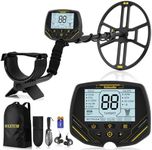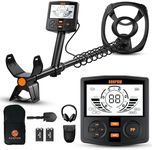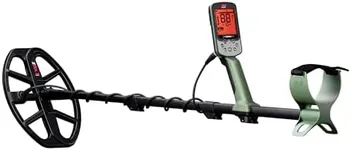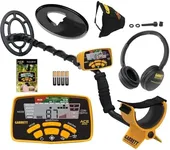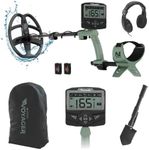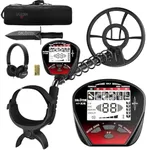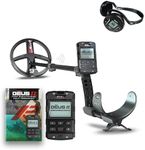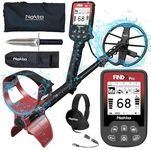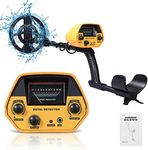Buying Guide for the Best Metal Detectors For Beginners
Choosing a metal detector as a beginner can be an exciting journey into the world of treasure hunting. The right metal detector will depend on where you plan to search, what you hope to find, and your level of experience. As a beginner, it's important to focus on a detector that is user-friendly, versatile, and offers good value for its features. Understanding the key specifications will help you make an informed decision and ensure that your metal detecting experience is enjoyable and rewarding.Operating FrequencyThe operating frequency of a metal detector refers to the number of times the detector's coil sends and receives signals per second. This is important because it affects the detector's sensitivity and depth capabilities. Lower frequencies (around 3-7 kHz) are better for detecting larger, deeper objects like relics and coins, while higher frequencies (above 15 kHz) are more sensitive to smaller objects like gold nuggets. For beginners, a mid-range frequency (around 8-15 kHz) is often a good choice as it provides a balance between depth and sensitivity, making it versatile for various types of treasure hunting.
DiscriminationDiscrimination is a feature that allows a metal detector to distinguish between different types of metals. This is important because it helps you avoid digging up unwanted items like nails or bottle caps. Discrimination settings can range from basic to advanced. Beginners should look for a detector with simple discrimination settings that allow you to easily filter out common trash items while still detecting valuable targets. As you gain experience, you can explore more advanced discrimination features to fine-tune your searches.
Ground BalanceGround balance is a feature that helps the metal detector ignore mineralization in the soil, which can cause false signals. This is important for accurate detection, especially in areas with high mineral content like beaches or gold-bearing grounds. There are three types of ground balance: preset, manual, and automatic. For beginners, automatic ground balance is the most user-friendly option as it adjusts itself to the ground conditions, allowing you to focus on detecting without constant adjustments.
Search Coil SizeThe search coil is the part of the metal detector that transmits and receives signals. Coil size affects the depth and area you can cover. Larger coils (over 11 inches) can detect deeper objects and cover more ground, but they may be less sensitive to small items and can be heavier. Smaller coils (under 8 inches) are more sensitive to small objects and are better for searching in tight spaces or areas with a lot of trash. For beginners, a medium-sized coil (8-11 inches) is a good compromise, offering a balance between depth, sensitivity, and ease of use.
Weight and ErgonomicsThe weight and ergonomics of a metal detector are important for comfort during use, especially for beginners who may spend long periods searching. A lighter detector is easier to handle and reduces fatigue, while good ergonomics ensure that the detector is comfortable to hold and operate. Look for a detector with an adjustable shaft and a comfortable grip. Trying out different models to see which feels best in your hands can help you choose a detector that you can use comfortably for extended periods.


